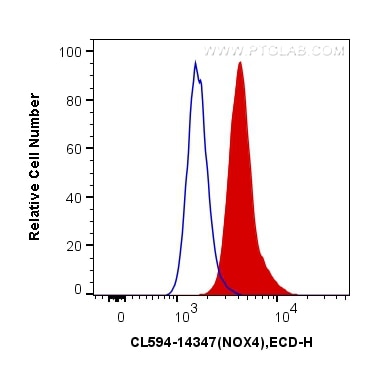Tested Applications
| Positive FC (Intra) detected in | HeLa cells |
Recommended dilution
| Application | Dilution |
|---|---|
| Flow Cytometry (FC) (INTRA) | FC (INTRA) : 0.40 ug per 10^6 cells in a 100 µl suspension |
| It is recommended that this reagent should be titrated in each testing system to obtain optimal results. | |
| Sample-dependent, Check data in validation data gallery. | |
Product Information
CL594-14347 targets NOX4 in FC (Intra) applications and shows reactivity with human, mouse, rat samples.
| Tested Reactivity | human, mouse, rat |
| Host / Isotype | Rabbit / IgG |
| Class | Polyclonal |
| Type | Antibody |
| Immunogen |
CatNo: Ag5687 Product name: Recombinant human NOX4 protein Source: e coli.-derived, PGEX-4T Tag: GST Domain: 224-578 aa of BC040105 Sequence: PGCISLNRTSSQNISLPEYFSEHFHEPFPEGFSKPAEFTQHKFVKICMEEPRFQANFPQTWLWISGPLCLYCAERLYRYIRSNKPVTIISVISHPSDVMEIRMVKENFKARPGQYITLHCPSVSALENHPFTLTMCPTETKATFGVHLKIVGDWTERFRDLLLPPSSQDSEILPFIQSRNYPKLYIDGPFGSPFEESLNYEVSLCVAGGIGVTPFASILNTLLDDWKPYKLRRLYFIWVCRDIQSFRWFADLLCMLHNKFWQENRPDYVNIQLYLSQTDGIQKIIGEKYHALNSRLFIGRPRWKLLFDEIAKYNRGKTVGVFCCGPNSLSKTLHKLSNQNNSYGTRFEYNKESFS Predict reactive species |
| Full Name | NADPH oxidase 4 |
| Calculated Molecular Weight | 67 kDa |
| Observed Molecular Weight | 62 kDa |
| GenBank Accession Number | BC040105 |
| Gene Symbol | NOX4 |
| Gene ID (NCBI) | 50507 |
| RRID | AB_2919804 |
| Conjugate | CoraLite®594 Fluorescent Dye |
| Excitation/Emission Maxima Wavelengths | 588 nm / 604 nm |
| Form | Liquid |
| Purification Method | Antigen affinity purification |
| UNIPROT ID | Q9NPH5 |
| Storage Buffer | PBS with 50% glycerol, 0.05% Proclin300, 0.5% BSA, pH 7.3. |
| Storage Conditions | Store at -20°C. Avoid exposure to light. Stable for one year after shipment. Aliquoting is unnecessary for -20oC storage. |
Background Information
NOX4 (NADPH oxidase 4) is a phagocyte-type oxidase, similar to that responsible for the production of large amounts of reactive oxygen species (ROS) in neutrophil granulocytes with resultant antimicrobial activity and it has been postulated to function in the kidney as an oxygen sensor that regulates the synthesis of erythropoietin in the renal cortex. Studies have reported molecular masses of Nox4 protein by western blot analysis ranging from 55 to 80 kDa. The truncated NOX4 splice variant D (28 kDa) lacks the majority of the transmembrane domain and has been shown to produce higher levels of ROS and DNA damage compared to its prototype. NOX4D has previously been shown to localise to the nucleus and nucleolus in various cell types and is implicated in the generation of reactive oxygen species (ROS) and DNA damage. (PMID: 11728818, PMID: 29285262, PMID: 14670934)
Protocols
| Product Specific Protocols | |
|---|---|
| FC protocol for CL594 NOX4 antibody CL594-14347 | Download protocol |
| Standard Protocols | |
|---|---|
| Click here to view our Standard Protocols |




